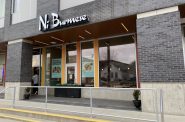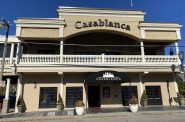The art of (slow) food
 The term “slow food” seems to fit perfectly with this time of year — stirring up images of rich, creamy soups and stews, hearty breads and all of the generally comforting flavors that help us prepare for the long, cold winter ahead.
The term “slow food” seems to fit perfectly with this time of year — stirring up images of rich, creamy soups and stews, hearty breads and all of the generally comforting flavors that help us prepare for the long, cold winter ahead.
But when it comes to the Slow Food Movement, the verbiage isn’t quite a reference to your crock pot (although that does play a role).
“Slow Food means good, clean, fair food,” says Robert Stockinger, Board President for Slow Food Wisconsin Southeast (SF WiSE), the local chapter of Slow Food USA.
He’s referring to food that tastes good, respects the season, is grown and harvested in an environmentally responsible manner, and that is also accessible to people, regardless of economic standing. And let’s not forget about the farmer — “fair” food means that the individuals and families who grow and pick food should be paid proper wages to maintain their dignity and their livelihood.
This Saturday, as part of Slow Food USA’s national day of action (themed “Dig In! Break Ground, Break Bread”), SF WiSE will host an all-day event pairing good local food with amazing works of art.
“The Art of Food” will be hosted within the magnificent grounds of the Lynden Sculpture Garden, featuring an evening of local and regional food and wine, along with music from around the globe as SF WiSE bids farewell to Sharon and Larry Adams, founders of Walnut Way Conservation Corp., along with Jennifer Casey the region’s biodiversity representative — the delegates to this year’s Terra Madre conference on biodiversity.
The Terra Madre was created a “platform to foster exchanges, discussions of common challenges, and proposals for replicable solutions – all with the common goal of global sustainability in food.” The conference is held every two years ,2010 being apt, as it is also the international Year of Biodiversity.
The Slow Food Movement began in Italy in the late 1980s, as a response to the prevailing “fast life” culture — from the proliferation of fast food restaurants around the globe to the advent of new technologies. It’s no doubt that in the last two decades, the human race has become accustomed to instant gratification in all aspects of life — entertainment, the way we receive information and most definitely in the way we eat.
The Milwaukee-area chapter of the non-profit organization was formed in 2003, with the singular (though multi-faceted) goal to help people in the metro area become better acquainted with their most basic source of nourishment.
Evidence of the slow food persuasion can be seen all over our fair city, in farm-to-table style restaurants and cafés that source their food from regional growers. Or in places like the Urban Ecology Center, Growing Power, SweetWater Organics and the aforementioned Walnut Way.
Locally, SF WiSE is involved in a variety of education and outreach efforts. Each spring,it publishes the Farm Fresh Atlas, a free fold-out map of area farms and farmer’s markets. They also run the Farmer-Chef Connection, creating relationships between food producers and buyers to facilitate direct purchasing options for food-related businesses in Milwaukee.
One of the national projects that drew Stockbridge to the movement is the Slow Food in Schools project, working to incorporate gardens into schools, and in turn put fresh, locally-grown food into cafeterias.
 “It’s really about instilling a presence in schools and showing kids ‘oh yeah, you can grow your own food,’” Stockbridge says, adding that the program was able to plant several 8×8 raised beds at an elementary school in Hales Corners.
“It’s really about instilling a presence in schools and showing kids ‘oh yeah, you can grow your own food,’” Stockbridge says, adding that the program was able to plant several 8×8 raised beds at an elementary school in Hales Corners.
Changing eating habits is no easy task. There are misconceptions that whole food is more expensive and time-consuming than say, a frozen dinner or a trip to the drive-thru. Beyond that, there’s the time and convenience factor. We all lead busy lives, and cooking a full meal often falls to the wayside. But if these habits are instilled at an early age, and if kids can learn where food comes from — and better yet, how to cook — it has the potential to change our fast-food culture.
Stockbridge affirms that getting local food into schools is a challenge, but a worthwhile one.
“It’s like the approach that environmental activists took toward recycling in the 70s by targeting kids,” he says, “so that eventually, by the time they grow up it’s the norm.”
The Art of Food event takes place tomorrow, Sept. 25, from 6-10 p.m. at the Lynden Sculpture Garden. There will also be a volunteer session held from 8-11 a.m. Saturday working in the gardens at Walnut Way on 17th & North Ave. For more information or to purchase tickets, visit the Slow Food WiSE website.
Art
-
It’s Not Just About the Holidays
 Dec 3rd, 2024 by Annie Raab
Dec 3rd, 2024 by Annie Raab
-
After The Election Is Over
 Nov 6th, 2024 by Annie Raab
Nov 6th, 2024 by Annie Raab
-
The Spirit of Milwaukee
 Aug 30th, 2024 by Annie Raab
Aug 30th, 2024 by Annie Raab
Dining
-
Eating Burmese in Bay View
 Dec 13th, 2025 by Cari Taylor-Carlson
Dec 13th, 2025 by Cari Taylor-Carlson
-
Casablanca Is a Milwaukee Success
 Nov 30th, 2025 by Cari Taylor-Carlson
Nov 30th, 2025 by Cari Taylor-Carlson
-
Saint Bibiana Has Great Burgers
 Nov 9th, 2025 by Cari Taylor-Carlson
Nov 9th, 2025 by Cari Taylor-Carlson























Erin thanks for bringing more information on healthy “slow” food to us. I heard about “slow” food while campaigning this last year and have wanted to learn more about it. Now you have provided me with some good leads. Please write more about it. My dad was a big fan of healthy food in the 60s and 70s but I have a long way to go to return to my healthy roots. It’s one slow cooked meal at a time.